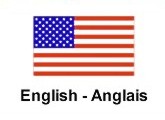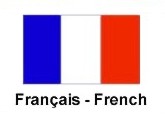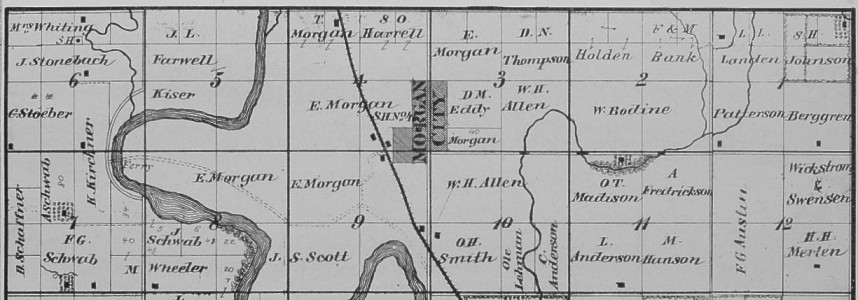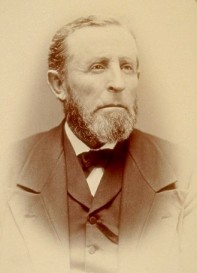An 1881 map of owners of property in the northern part of Clay County surrounding Morganville. Eben Morgan is identified as the owner of the southern half of Section 4 (320 acres), the northern half of Section 8 (320 acres), the northern half of Section 9 (320 acres) and the northwest quarter of Section 3 (160 acres) for a total of 1,120 acres. He also owned scattered lands farther from the village. The "T. Morgan" in the northwest quarter of Section 4 is Thomas Morgan, Eben's eldest son.
Captain Morgan
Now we sing the song of Morganville,
Tell the tale of destiny and chance.
Should you ask me whence these stories,
Whence these legends and traditions,
With the memory of wigwams,
And the creaking covered wagons
And the life of Captain Morgan,
And the nonsense and the half-facts?
Say we found them in an old house;
Say they're children's half-heard tales;
Say we heard them in the pool hall;
In the grocery store and church.
Some are mentioned, some are left out,
As a squirrel chooses corn.
We repeat them as we heard them,
From the lips of friendly gossips.
Found these bits so wild and wayward,
From the ones who do the talking;
From the ones who add and fix them;
From the savers of old clippings;
From an heirloom like a shawl.
From the extra cup of coffee,
From the cluttered city hall.
While the Shawnees and the Pawnees
Hunted deer along the Kaw,
Around the world upon the sea
Eb Morgan hunted whales.
Comment
Any society moves forward accompanied by its history, although the remembering of that history is always imperfect. The means
of transmission of its history may be word of mouth, retained relics, stories, songs, or even details of how things are made,
the language used, etc.
They may be passed on in almost any setting, such as gossiping in a store or by seeing a relic in a home. The "extra cup
of coffee" probably references the fact that Scandinavians were known as great coffee drinkers and Morganville had many
Swedes.
While the Native Americans were hunting deer in Kansas, Ebenezer Morgan was far away hunting whales.
Ebenezer Morgan was born in Groton, Connecticut in 1817 and orphaned as a youngster. At age 12, he sailed on a
whaling boat. Over time, he bettered himself, rising to be a storied captain of whaling ships. He was the first
to plant an American flag in Alaska after the United States purchased it from Russia. He invested widely in real estate. He
apparently had a dream of leaving the sea and having a ranch in the West.
The last poem paragraph refers to the Shawnee and Pawnee Native American tribes who hunted the then-unsettled Morganville area
while Morgan was a youngster on a whaling ship. Kaw is another name for the Kansas River. It begins where the
Smoky Hill and Republican rivers join. Carson probably wanted to use the latter, but it did not fit the poem's meter.
Ebenezer Morgan
As a small boy of New London
In Connecticut, the place
Of clipper ships and captains' homes
And chests of Spanish lace,
And teakwood and sandalwood
And tales of distant ports,
He stowed away and sailed the world
Until his hair was grey.
And all the while he hoisted sail,
And scrubbed the crusted decks,
And read the stars and studied charts,
And won his clipper ship,
And dodged typhoons and coral reef.
In the vast and wild Pacific,
In the wild and vast Atlantic,
In the gulf and Indian Ocean
And the outpost of Cape Horn,
And knew a girl in every port
From Asia to Peru -
He had a dream and purpose!
He had a Shangri La.
He had a gleam of glamour for the tedium of his day.
When he'd made his wealth from whaling,
From the dreariness of oceans,
The monotony of travel,
From pursuing "Moby Dicks,"
In the same old South Sea Islands -
He would seek the great Wild West!
He would ride a horse! And cattle
Would graze the sheltered plains
Halfway between the oceans.
He chose this spot in Kansas.
Too far for temple bells
From any a heathen port
To hinder meadowlarks.
No others must be there!
Here in the arm of water one could wade;
Here in the shelter of a wall of hills;
Here where you'd have to dig the earth to China;
Here on ground that never ebbed in tide;
Came the ex-Captain Ebenezer Morgan.
In 1870 to shut away the world.
Look! As those who are uneasy in their hearts
May see the spirits of the Indians yet
Watching us from shadows of the trees -
Is that a covered wagon, or a ghost?
Is that the living story of us all?
Watch quietly! This is your past,
Your grandma's or your mother's.
This is the beginning of Morganville.
Carson is probably using a bit of poetic license here as clipper ships were for transport and there is no evidence
that Morgan was anything but a whaler.
Stereotypes of a sailor's life probably inspired the "girl in every port." While quite possibly true, Morgan was
married and was known to be exceptionally religious.
Moby Dick was the name of a whale in Herman Melville's famous novel of the same name.
About 1869, Morgan moved to Kansas. He bought more than a thousand acres near the future Morganville.
The meadowlark is the state bird of Kansas.
The Republican River is shallow.
An expression of Carson's time: if a person dug a hole deep enough, he would reach China.
The Native Americans moved from the stage to the tree-lined area overlooking the stage at the left rear, to watch what
came after their days at Morganville.
Carson also notes that each person watching is not very far removed from the story being told.



